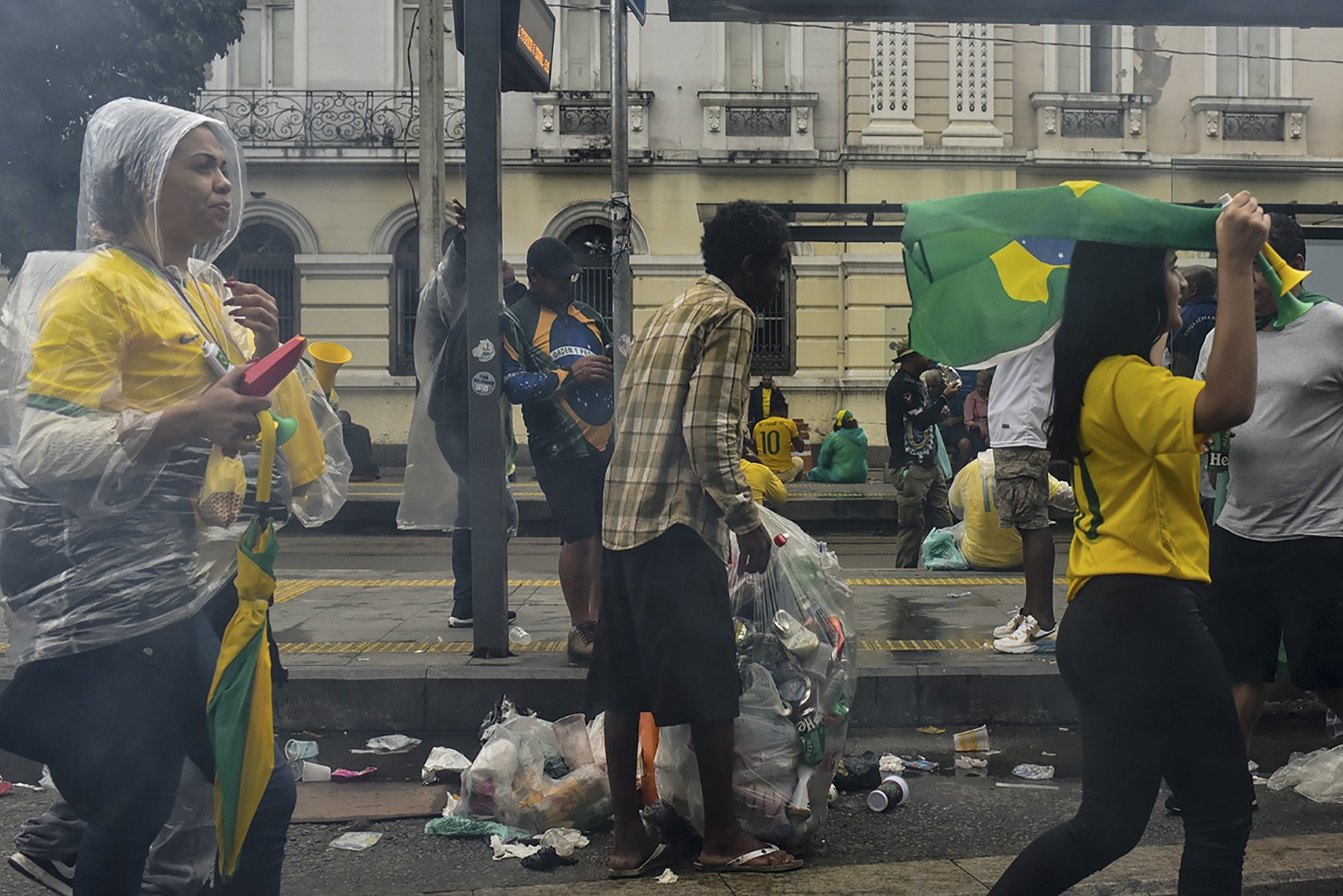The Point of Contention of Brazil’s 2022 Presidential Elections
RIO DE JANEIRO, BRAZIL. NOVEMBER 02, 2022: Bolsonaro supporters protest in Rio’s city center. Groups gathered in front of the Eastern Military Command to protest against the results of the elections. They call for military intervention by the Brazilian army. Photo by Fabio Teixeira.
Lula has won the Brazilian presidential election this year, but Bolsonaro supporters are taking to the streets demanding “federal intervention” to impede the “installation of communism” in the country. Nowadays, however, Lula advocates for a mixed economy, and the main arguments against him are that he is corrupt, and that he will foment organized crime and chaos. Communism here is used as a smoke screen to conceal fantasies of a military dictatorship come-back and of genocide of poor and black people — the demographic Lula seeks to include in the market economy.
After questioning the election results, Gustavo Gayer, a politician, influencer and YouTuber, removed several videos he posted last week on YouTube, and had his Twitter account suspended. In the video called “Urgent! Lula voters have already begun to terrorize Brazil. Strong scenes”, the strongest scene according to him was a woman’s recording of a building being invaded across the street from her apartment, where she sounded clearly terrified. Gayer fails to indicate the context of such invasion, as is customary in his work. He has already been condemned for propagating Fake News twice this year, both times involving other politicians and Covid-19 policies.
What the Brazilian electorate considers to be terrifying is at the core of the political polarization we are witnessing. While one housed woman (representing about half of the Brazilian voting population) is horrified at seeing a large group of poor people invade a building and put tarp on the windows — the other half is horrified at seeing widespread misery, homelessness, and hunger.
The occupation of this building in particular was the work of a group called Struggle-for-Housing Front (Frente de Luta por Moradia — FLM), which exists for 2 decades and advocates for dignified housing rights in São Paulo. The building was empty, no one was assaulted or removed from their homes other than the occupiers themselves. In fact, the group published a letter from São Paulo’s Court of Justice stating that the police is the one acting criminally, if it 1) imposes physical or psychological violence against the occupiers, 2) restricts their access to water, food, electricity, lawyers and public defenders.
RIO DE JANEIRO, BRAZIL. NOVEMBER 02, 2022. Photo by Fabio Teixeira.
What constitutes justified criminal behavior seems to be the point of contention here, as opposed to a stern anti-crime stance by good, lawful, Christian citizens in face of profane, lawless communists. Spreading fake news and police brutality, though unlawful, is tolerated or even applauded by Bolsonaro supporters, while the fight for dignified housing is described as such:
“Crime has won. Our lives will be hell. Homicides will go up. [Drug] trafficking will go up. Criminals will reign. Because now their boss sits, will sit, at the presidential chair. Brazil is no longer a friendly place for good people, patriots, Christians… I don’t know what else to say. They have managed it and will destroy our country.”
— Gustavo Gayer, on the (since removed) video “Urgent! Lula voters have already begun to terrorize Brazil. Strong scenes” on YouTube. From October 31st, with 462 thousand views in 6 hours.
RIO DE JANEIRO, BRAZIL. OCTOBER 20, 2022: Former President Luis Inácio Lula da Silva was in the city of São Gonçalo, state of Rio de Janeiro. He participated in a motorcade, and also in a press conference at the Hotel Pestana, Copacabana. Lula ended the visit in the West Zone of the city. Photo by Fabio Teixeira.
In a recent piece by Eduardo Barbosa entitled “Between bullets and mining: the life of indigenous peoples and black favela residents under the state of exception”, this tolerance for certain criminal behaviors by enthusiastic defenders of the rule of law is described as a State of Exception. The Bolsonaro regime is, or was, an extension and exacerbation of decades of “perverted policies” which enacted “recurrent massacres in favelas and the serial extermination of native peoples”. These demographics are a target because they undermine the power the State has over certain territories. In this sense, they are a threat to the State, and the desire to eradicate them trumps the patriot’s law-abiding rhetoric and becomes a well-established mechanism.
There is a massive class of Brazilians which are repulsed by the poor and marginalized. They may think of ways to lift people out of poverty with economic incentives and charity, while others advocate for literal eradication, through the barrel of a gun. There is plenty to be questioned about the use of capitalist tools to solve an issue that capitalism not only creates but relies on to thrive — class disparity. Mass murder, however, is beyond questioning, it’s the abysmal, unbridgeable gap in the binary political landscape we are living in.
RIO DE JANEIRO, BRAZIL. OCTOBER 20, 2022: Photo by Fabio Teixeira.
Lula will not be able to single-handedly eradicate the nation’s hate towards the poor, or shift humanity’s course away from economic despair and global collapse.
Expectations of his potential for change are high, but unrealistic. What we need is a shift in culture. The narrative Bolsonaro normalized has been shunned not only by the Brazilian electorate, but also by international communities. Still, the win was narrow, and supporters have ironclad convictions on both sides. In this sense, the ballot box isn’t a tool which produces rightfulness. Legitimacy and dignity are ideals we need to uphold, defend, and fight for every day, not only every 4 years.
Mirna Wabi-Sabi
is a writer, editor and founder of Plataforma9.





